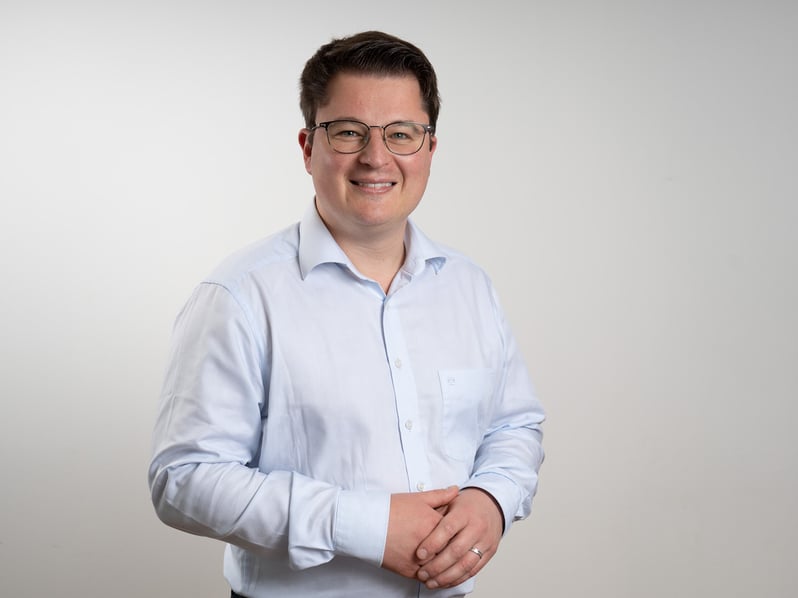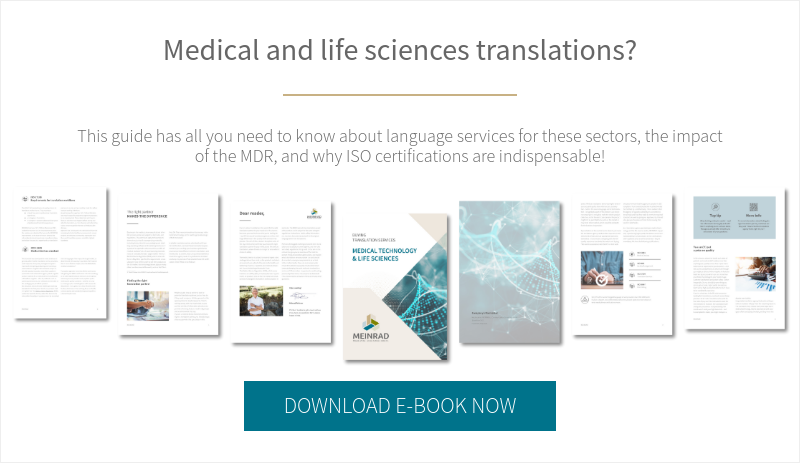
Albin Skasa is the CEO of Austrian medtech start-up Medaia, which offers a SkinScreener app for early, low-threshold skin cancer risk assessment. We speak to Skasa about the challenges of obtaining approval for a medical device and about the importance and the impact of high-quality translations for businesses looking to go global.
Please tell us a bit about what you do at Medaia and about your team.
Medaia is a start-up based in Graz, and we offer an app called SkinScreener to make it easy for people to assess their risk of skin cancer at an early stage. Our company was founded by two doctors, a dermatologist and a general practitioner. In 2015 they had the idea that smartphones could be used to classify skin lesions. Early diagnosis is extremely important with skin cancer – if melanoma is detected early, the chance of recovery is over 90%, but if it isn’t detected until a later stage, that chance drops to 5%. The MVP version of the app was ready in 2018, and we commissioned a study at the Medical University of Graz. The company Medaia GmbH was founded in 2019, and then we worked on launching the SkinScreener app as a medical device for Android and Apple on the market in Austria, Germany, Great Britain and Ireland, which ultimately happened in August 2020. Our team has steadily grown since then: I myself joined Medaia at the end of 2020, and since August 2021 I have been responsible for our economic fortunes as CEO. We currently have 12 people in our team covering a wide range of areas – as you’d expect, they include software development, regulatory affairs and marketing. We got ISO 13485 and MDR certification at the end of 2022. So high-quality products are very important for us.
So the SkinScreener app is the core of your business. What developments are currently taking up most of your time?
SkinScreener is one of the first apps in the world for end customers which exclusively uses artificial intelligence to detect skin tumours at an early stage – with over 90% accuracy. We now have 270,000 B2C downloads, and we’ve analysed 630,000 images. And our customers include insurance companies.
The aim of the app is to complement visits to a dermatologist rather than replace them. My personal view is that by the end of the decade the healthcare system in many countries will have changed enormously, as platform solutions and various other solutions using AI will be available to help with people’s health issues. As members of the public, we won’t (be able to) go to the doctor every time we think something’s wrong – there are some things which we’ll have to do for ourselves in order to keep national healthcare systems going. That’s where our app comes in. Our aspiration, and our mission, is to provide high-quality tools for easy, low-threshold diagnosis of skin cancer at an early stage, and in future for other skin diseases. We want people who aren’t medical experts to get an initial assessment as quickly as possible.
Could you talk us through the development process, from the idea through to full implementation? What hurdles did you have to overcome to obtain approval to launch the app on the market?
Firstly, of course, you need the idea and the developers. But when producing a medical device, regulatory experts are also very important, and we have three of them. And as we put together the technical documentation, we worked on the quality management system at the same time – the technical and procedural aspects of quality management have to complement the clinical/medical side of things in order to produce an ISO-certified system and establish a medical device on the market. So far, we’ve invested almost 2 million euros in developing the app.
Did opening up new markets pose new challenges?
Yes, it did. The next challenge was, and is, expanding into other markets. Although there’s a harmonized market in Europe, other countries have their own specific regulations which can only be complied with if you have a team with the relevant expertise, the necessary financial means, and a good deal of patience. I say patience because lots of things needed to be in place to get approval in countries outside Europe, and the approval bodies in those countries are snowed under.
We want as many people as possible around the world to have access to the SkinScreener app, so that they can lead a healthy life. And going global means we need a multi-lingual app. What was your approach to translation for your software texts and other documentation for the app?
We see ourselves as an exporter. It would be fairly easy to launch an app in other countries using an app store, if it weren’t for the regulations on medical devices in each country.
At first, our app was available in four countries, and we started by doing the translations ourselves – at the time just into English. But then we developed an interest in France, Italy, Portugal and Spain, and of course that meant more translations were needed. We already had a translation service provider when I joined Medaia, but the feedback I got from various people in those countries wasn’t very good. They said the translations were clunky, like they’d been done by amateurs rather than professionals, and the auditor at our notified body was also heavily critical of this aspect. It wasn’t that they made the product (i.e. the app) dangerous, but poor translations aren’t what we aspire to produce. Ours is a high-quality product, and the language has to be high-quality too. I think language is one area where high quality really comes to the fore, so I started looking for a new translation partner that shared our focus on automation.
What do you think are the most important criteria when choosing a translation agency? How and where did you look for a suitable service provider, and was the regional factor part of it?
To be honest, I can’t remember exactly how I looked for agencies and how I eventually came across MEINRAD. But for me, specialization in medical translations is extremely important. And yes, the regional factor did play a part. Although we can now work remotely and do everything online or over the phone, having a company around the corner gives me the reassurance that it’s “there”, and I can get a much better idea of the people behind the scenes. ISO 13485 certification is an added bonus, though it wasn’t the be-all and end-all for me. Another key factor was the response time. They say “time is money”, and that really is true for start-ups – I can’t afford to wait all day for a response.
Are there lessons you’ve learned from working with previous service providers? In particular when things haven’t gone according to plan?
One lesson we learned as an app developer was definitely that translated/localized texts can be longer than the original, and to factor that in to avoid lots more work later in the process. Some of the less impressive translation agencies don’t warn you about that. A specialist in this field is a huge help, and they’ll save you lots of time and money.
I think you just have to know what you expect from a translation, and what your aspirations are. For us, high-quality products go hand in hand with high-quality translations. In B2B, you lose the moment you publish a bad translation – as soon as someone reads “OK Press”, for example, they rightly begin to question the quality of the entire product. You might get away with it with direct B2C users, but we’re aiming higher than that.
What advice would you give other medtech start-ups if they asked you for help choosing a translation service provider?
I’d advise them to invest a good amount of time in researching providers – after all, they should be looking for a long-term partnership with a translation agency. It’s definitely worth taking a close look at their websites and reading the testimonials. For me, it’s important to see that the translation agency has other clients from our sector, so that I can be confident the agency is familiar with medical translations.
Is it critical for a translation service provider to have certifications (ISO 13485 and ISO 17100), and if so, why?
Not necessarily. Of course it says a lot about their quality standards, but the main thing for us is specialization in the medical sector and a passion for automation, which we believe is the future. Those annoying and avoidable jobs need to be automated in order to give highly qualified staff time for the work that matters most.
What surprises do you think the future of the life sciences industry has in store, and what role will AI play in it?
Artificial intelligence – particularly generative AI – is a pioneering breakthrough, comparable with the invention of the internet. Putting it crudely, it’s absolutely insane what AI can do, and I’m sure it’ll have a massive impact on us in various areas. I think it’ll affect text creation faster than image creation, and one result will be faster translation workflows. But I’d also say that decisions ultimately have to be made by a human being, so we won’t be entirely replaced. There are some things that machines just can’t do – and that’s where the issue of liability comes into play. Who’s liable if ChatGPT gets something wrong? That’s how we see our app: it can’t, and shouldn’t, replace dermatologists. Instead, it should give them a quick initial assessment.
Your app texts are produced using the human translation workflow. Would you consider using machine translation in conjunction with full post-editing?
Definitely, and I’d pretty much expect it, as long as it was a suitable type of text. But for texts with little context, like our GUI texts, the MT engines just aren’t yet able to work out what’s supposed to go where, which means they’re likely to get things wrong and aren’t much help.
And finally, do you have any top tips for your colleagues in the sector who are thinking of going global with their business?
I’d advise thinking about exporting as early as possible, and looking around for a suitable partner that doesn’t just deliver high-quality translations but also offers a similar level of all-round service and consulting.
Thank you for talking to us!
Main image © medaia


